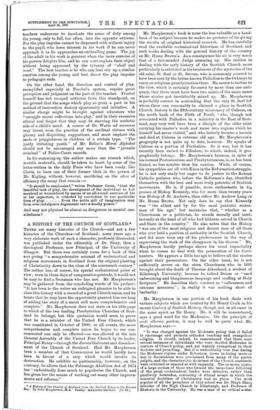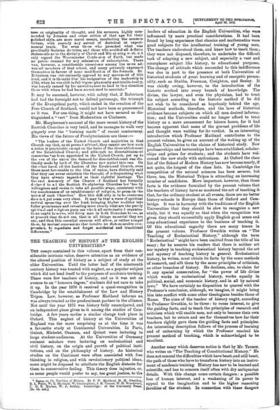A HISTORY OF THE CHURCH OF SCOTLAND.* THERE are many
histories of the Church—and not a few histories of the Churches—of Scotland; some years ago a very elaborate work of such a character, profusely illustrated, was published under the editorship of Dr. Story, then a theological Professor, now Principal, of the University of Glasgow. But there was certainly room for a book of this sort giving "a comprehensive account of ecclesiastical and religious movements in Scotland from the original planting of Christianity down to the close of the nineteenth century." The author has, of course, his special ecclesiastical point of view; even in these days of comparative quietude, it would not be easy to find a Scotsman who has not. Mr. Macpherson's may be "gathered from the concluding words of his preface : "It has been to the writer an unfeigned pleasure to be able to close this history with a record of a great Church union, and he trusts that he may have the opportunity granted him ere long of adding the story of a union still more comprehensive and complete." Mr. Macpherson does not state on his title-page to which of the two leading Presbyterian Churches of Scot- land he belongs, but this quotation would seem to prove that he is a minister of the United Free Church, which was constituted in October of 1900; at all events, the more comprehensive and complete union he hopes to see con- summated can only be effected—as was allowed at the late General Assembly of the United Free Church by its leader, Principal Rainy—through the disestablishment and disendow- ment of the Church of Scotland. Had Mr. Macpherson been a member of that Communion he would hardly have been in favour of a step which would involve its destruction. He exhibits no partisanship, however ; on the contrary, he allows that the Patronage Abolition Act of 1874 has "undoubtedly done much to popularise the Church, and has given her the means of working out many other improve- ments and reforms?'
• 4 History of the Church of Scotland from the Earliest Times to ths Present Hay. By. Johu Macpherson, MA. Paisley : Alexander Gardner. [7s. ed.]
Mr. Macpherson's book is none the less valuable as a hand- book of its subject because he makes no pretence of its giving the results of original historical research. He has carefully read the available ecclesiastical historians of Scotland, and such works dealing with the general history of the country as Mr. Hume Brown's. As a consequence his air is very much that of a fair-minded Judge summing up. His caution in dealing with the early history of the Scottish Church more particularly is exhibited in his treatment of the mysteries of the old saint, St. Serf or St. Servan, who is commonly averred to have been sent by the better-known Palladius to the Orkneys to carry on religious proselytisation there. He seems to incline to the view, which is certainly favoured by more than one anti- quary, that there must have been two saints of the same name whose stories got inextricably mixed up. Mr. Macpherson is probably correct in contending that the only St. Serf for whom there can reasonably be claimed a place in 'Scottish Church history is the fifth-century missionary of Culroas, on the north bank of the Firth of Forth, "who, though not associated with Palladino in a ministry in the East of Scot- land, may very well have been a disciple of the older saint carrying his master's work and name into regions which he himself had never visited," and who latterly became a hermit and died at Culroas in extreme old age. Mr. Macpherson's geography is not quite up to date, however. He speaks of Culross as a portion of Perthshire. So it was, but it has recently been united to Fifeshire, to which, indeed, it geo- graphically belongs. Mr. Macpherson's fairness, in spite of his earnest Protestantism and Presbyterianism, is, as has been hinted, no less notable than his caution. While, of course, his sympathies are all with Knox in the Reformation struggle, he is not only ready but eager to do justice to the Roman Catholic prelates who, before the Reformer's day, identified
themselves with the best and most truly patriotic of Scottish movements. He is, if possible, more enthusiastic in his praises of Bishop Kennedy, who for more than twenty years was Bishop of St. Andrews, than either Mr. Andrew Lang or Mr. Hume Brown. Not only does be say that Kennedy was "the ablest and by far the most patriotic states. man of his age," but maintains that, "whether as a Churchman or a politician, he stands morally and intel. lectually at the head of all who had hitherto served in Church and State in the country." He also notes that the Bishop "was one of the most religious and devout men of all those who ever held a position of authority in the Scottish Church; and did more than any of his predecessors in the way of supervising the work of the clergymen in his diocese." Mr, Macpherson hardly perhaps shows his usual impartiality when he comes to deal with the persecution of the Cove- nanters. He appears a little too apt to believe all the stories against their persecutors. On the other hand, he is not sufficiently severe, on the stern Churchmen who in 1695.
brought about the death of Thomas Aikenhead, a student of Edinburgh University, because he talked Deism or "used unbecoming and blasphemous language and scoffing at Holy Scripture." He describes their conduct as "callousness and extreme measures " ; in reality it was nothing short of barbarity.
Mr. Macpherson in one portion of his book deals with various subjects which are treated by Sir Henry Craik in his
recent Century of Scottish History, though not in all cases in the same spirit as Sir Henry. He, it will be remembered, says a good word for the Moderates. On the principle of audi alteram partem, it may be well to quote what Mr.
Macpherson says :—
"It was charged against the Moderate policy that it failed to encourage and promote orthodox teaching and evangelical religion. It should, indeed, be remembered that there were several instances of individuals who were decided Moderates in matters of Church policy, and yet warmly evangelical in their doctrine and preaching. But it is undoubtedly true that during the Moderate regime under Robertson views inclining more or less to Socinianism were proclaimed from many of the parish pulpits, and the characteristic doctrines of the Church standards were criticised or sneered at with impunity. The salmons, agaio, of a large section of those who formed the immediate following of the great (eclesiastical leader were defective rather than positively heterodox, consisting of ethical essays in which the essential doctrines of Christianity had no place. The most popular of all the preachers of that school was Dr. Hugh Blair, minister of the High Church in Edinburgh, and Professor of Rhetoric in the University. He was a man of no critical acute- netts or originality of thought, and his sermons, highly com- mended by Johnson and other critics of that age for their polished style. are mere moral essays, inculcating the common virtues, with scarcely any savour of doctrinal or experi- mental truth. Yet even those who preached what was practically Socinian doltrine, and those who avoided all definite statements as to the divinity of Christ and His atoning w. rk, n only signed the Westminster Confe-sion of Faith, but made no public demand for any relaxation of subscription. There was, however, a considerable uneasiness among the more ad- vaned members of that school, and many privately expressed themselves in favour of some modification of the formula. Dr. Robertson was determinedly opposed to any movement of this kind, and it is thought that his resignation of the leadership in 1780, when he was still in fult vigour physically and intellectually, was basely caused by his unwillingness to lead in this direction those with whom he had been accustomed to associate."
It may be assumed, however, with safety that, if Robertson had had the foresight not to defend patronage, the triumph of the Evangelical party, which ended in the creation of the Free Church of Scotland, would not have been so pronounced as it was. For one thing, it might not have secured so dis- tinguished a " vert" from Moderatism as Chalmers.
Mr. Macpherson's account of the more recent history of the Scottish Churches is very lucid, and he manages to walk very gingerly over the "burning nuirle " of recent controversy. His views of the future of Presbyterianism are these :—
The leaders of the United Church and majorities in that Church say that, as at presebt advised, they cannot see how such a union is practicable except on the basis of the digest ablish went of the Established Church; and although no disestablishment committee has been appointed in the 'United Church. yet up to the eve of the union the demand for disestablishinent was die. tinctly made by both of the Churches now uuited into one. On the other hand, all the leaders of the Estabrisned Church, even those most favourable to the idea of union, have distinctly said that they can never entertain the thought of relinquishing what they have always regarded as their rightful heritage. The Ge, eral Assembly of the Church ..f Scotland has formally &elan d to a 1 the Scottish Fr. sbyterian Churches her'heir ,ty willingness and desire to take all possible steps, consistent with the maintenance of an establishment of religion, to promote the union of such Churches.' How this difiloulty is to be overcome does not yet seem very clear. It may be that a wave of spiritual revival spreading over the land, bringing higher realities into fuller prominence and revealing more clearly what are the purely spi, itusl and religious purp-SeS whi h all ecclesiastic .1 organisa- tions ought to serve, will bring men in b..th Cnurches to ,ee, as at. present they do not see, that in all things es.ential they are one, and that this essential oneness will allow, or rather compel them, by mutual concessions that involve no dishonourable com- promises, to repudiate and forget accidental and trauitional differences."



























































 Previous page
Previous page